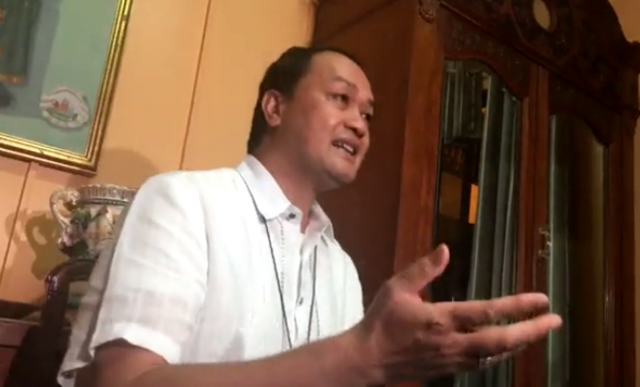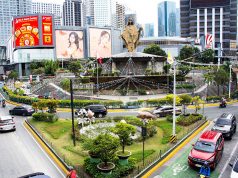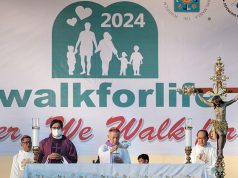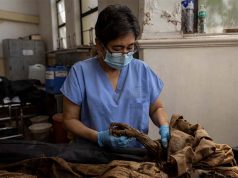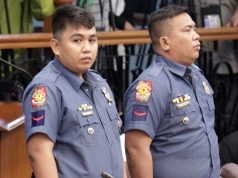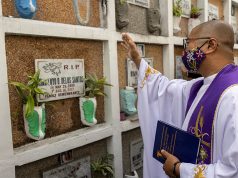MANILA, Philippines – At about 11:30 pm on Saturday, the father of a witness in Kian Delos Santos’ slay was lounging in a long sofa together with his children – a sight he did not imagine to happen that soon.
Father and children were happy to be reunited that day. They were also already able to speak with the children’s mother, a migrant worker in the Middle East, to allay her fears over their safety.
The father told the children in jest that they inherited their courage from their mother, after the children insisted that they stay under a local church’s protective custody despite what was perceived as police pressure that the family stay with the police.
Their father – whose identity won’t be revealed for security purposes – was in detention awaiting trial over a drug-related case.
Curiously, he was ordered released on bail by a Caloocan court, to the initial shock of government lawyers from the Public Attorney’s Office (PAO) in Caloocan City, which considered him an indigent and assisted him in his case.
“Nabalitaan ng PAO Caloocan sa court na nakapag-bail (The PAO Caloocan learned from the court that bail was posted),” explained Persida Acosta in a text message.
PAO: don’t drag us into this
The PAO has denied having a hand in trying, with the help of police, to have custody of a witness in Delos Santos’ murder transferred from a local church, saying its current case against cops tagged in the slay is strong as it is.
“We have our own witness,” said PAO Chief Persida Acosta in Filipino in a phone interview before Saturday midnight.
She also denied the information from Bishop Pablo Virgilio David at a near-midnight Saturday press conference, that PAO had bailed out the father of the witness in church custody.
Bishop David of the Roman Catholic Diocese of Kalookan — covering Caloocan City-South, Malabon City, and Navotas City – had taken protective custody of the witnesses. Their father initially demanded the church turn over custody to him, but decided to himself stay in the church’s care after an hours-long closed-door session with authorities and a huddle with his children.
Acosta explained how PAO may have been mistakenly dragged into the standoff: it was a lawyer from the PAO in Caloocan who had assisted the father in his arraignment in an ongoing drug-related case — before Kian’s killing. The handling lawyer only learned from the court itself that the father had been bailed out, which initially worried PAO Caloocan.
Acosta said the lawyer was alarmed “right after” learning an indigent they assisted was already out on bail.
But, Acosta said, it was “later learned that he [the father] was safe and secured by the CIDG,” referring to the PNP’s Criminal Investigation and Detection Group.
The CIDG was ordered by PNP in August to also investigate the killing by Caloocan cops of teenager Delos Santos, which become a rallying point against the thousands of deaths in the police drug busts that authorities have tagged as a “normal” part of the Duterte administration’s anti-drug drive.
A press conference was held around Saturday midnight by Bishop David on what became a short-lived custody row.
“It was resolved peacefully. The father of the witnesses asked to be released from CIDG custody and join his children under Church’s protective custody. The CIDG respected the decision,” David explained in a text message that night. David had said in the press conference that PAO had bailed out the witness’ father.
PAO insists no PAO lawyer was present in that meeting.
PAO stands as counsel to Delos Santos’ parents, who have filed a complaint before the Justice department over their son’s killing.
Who posted bail for witness’ dad?
Acosta said she does not know who posted bail for the father.
But on Saturday afternoon, CIDG members as well as the non-profit Volunteers Against Crime and Corruption (VACC) went to the San Roque Cathedral in Caloocan City with the father, who his children thought was still in detention.
The cathedral is considered the bishop’s residence of the Roman Catholic Diocese of Kalookan. The church had custody of witnesses to the killing of Delos Santos last August, including the siblings of one witness. They were all in a safe house under the church’s care.
The day ended in an impromptu press conference by Bishop David, where he explained that the CIDG eventually respected the father’s decision to stay with his children in church custody.
Why in police custody?
Though the custody row was short-lived, the situation begged the question: Why was the father in police custody?
Rule 114, Section 19 of the Rules of Court states that an “accused must be discharged upon approval of the bail by the judge with whom it was filed.” The posting of bail should be in accordance with Section 17 of the same rule.
Section 17 outlines the requirements for bail, which were presumably all met in this case, as the court itself ordered the provisional liberty of the detained.
In simpler terms, Rule 114 assures temporary liberty for the detained, unless he is being detained for some other cause.
This means, the police had no reason to hold the father under their custody after having bailed out, unless the police is in possession of an arrest warrant against him in another case.
Another exception to this rule on provisional liberty would be found in Rule 113, Section 5 of the Rules of Court, which pertains to warrantless arrests.
As the father was eventually released to the church’s custody, it is presumed there was no rules-based reason for the custody, or the police would not have let go of him.
While the CIDG was ordered by the PNP to probe the Delos Santos killing, a pending investigation is not necessarily a reason to take custody of a person. Based on court rules, such can only be done if there is an arrest warrant or if the warrantless arrest is valid.
Ideally, the father should have also voluntarily sought CIDG’s protection instead of him being approached by the group.
The father had told his children’s legal counsel that he did everything that the police told him to do “just so he could see his children.”
“He spoke of his fear and worry that he may not see them again, that was why he cooperated with the police,” said lawyer June Ambrosio of the Integrated Bar of the Philippines National Center for Legal Aid in a text message.
This writer repeatedly sought the side of the police on the matter through PNP spokesperson Dionardo Carlos, but he has yet to respond as of posting time.
There are, meanwhile, pressing questions that beg for answers: Who ordered the bailing out of the father and whose money was used? On what grounds was he taken under police custody?
VACC says didn’t post bail, explains side
Acosta in the phone interview pointed to the VACC, a group some of whose members are seen as allied with President Rodrigo Duterte.
“That was just Paras there,” Acosta said, referring to lawyer Jing Paras who Bishop David said was called by the VACC and CIDG for the meeting.
In later text messages, Acosta then said that “at least the VACC has done its best to assist the father to look for the children.”
VACC Spokesperson Boy Arsenio Evangelista said it was the father himself who sought the group’s legal assistance for his family to be placed under the witness protection program of the Department of Justice (DOJ).
“Maybe that’s the reason why Atty. Paras was there,” he said.
VACC’s Rose Roque, meanwhile, gave this explanation: “When he [the father] was bailed out, he went to the barangay to seek help when he found out that his children were missing and there was a barangay blotter.”
When nothing happened, however, “he went to the CIDG to ask help from a Major Villanueva,” and the father got an advice to “write a letter to FC/Pres of VACC Dante Jimenez and Atty Paras gave his free legal services.”
Roque, however, has no reply yet on the question of who bailed him out.
When asked who bailed the father out, Evangelista said he had no idea that the father was even in detention for another case. He was also mum on the CIDG’s role on the matter, but insisted that VACC together with the WPP has a proven record in extending legal aid and securing state witnesses.
Evangelista, meanwhile, wondered aloud whether the church had the human and material resources to sustain custody and ensure safety of the witnesses and their family.
“Remember this will be a very long case… Paano ‘yung simbahan? Pulis ‘to, walang kaluluwa itong talagang kayang gawin nila ‘yun. Baka madamay lang sila (Remember this will be a very long case… How about the church? These are soulless policemen who can do this kind of thing. The church might just be unduly affected),” he said.

